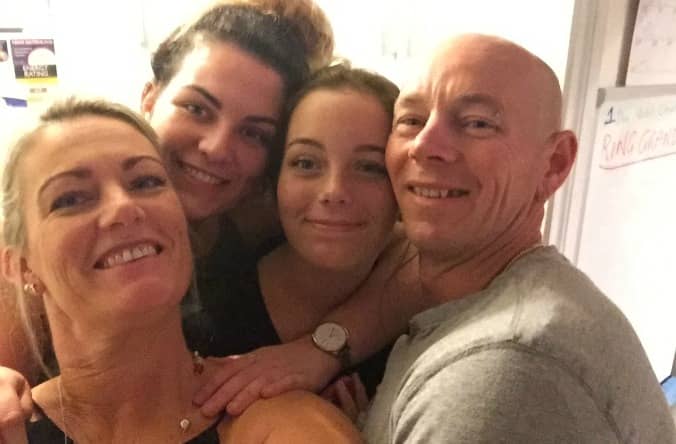When Deb Weeks was diagnosed with bowel cancer, she had been feeling the best she’d felt in her whole life.
She’d turned 40 just months earlier and was in a “good place” with her health, fitness and family. So when she noticed a hint of dull, “dusty pink” blood on her toilet paper one day — with no other symptoms — she didn’t think to act on it. Even when she eventually went to have it checked out, Deb was sure nothing was wrong, and her doctor was equally unconcerned.
“She said, ‘We’ll just do a stool test… you’re pretty fit and healthy and young so it’s probably nothing sinister, but we’ll just check it out anyway’,” the mum of two recalls.
This test detected a small amount of blood, so Deb was referred to a surgeon at her local hospital on the NSW south coast who put her on the waiting list for a colonoscopy. It was at this point she began to notice more blood.
“I started to worry, but I still didn’t feel sick. I still didn’t feel off. Like, my bowels were normal and I didn’t feel unwell in the slightest,” she recalls.
Deb ended up booking in at a private clinic in a nearby town to speed up the process. When she awoke from the colonoscopy, Deb was told her symptoms had most likely been caused by polyps, but that she would receive her test results the following week.
However, within days she was back in her GP’s office receiving some unthinkable news. “[My doctor] was very apologetic, very upset. She couldn’t even tell me… she’s just pushing this pathology result in front of me saying, ‘You read it’,” Deb, now 43, says.
Her own reaction was one of shock, and worry for the future of her daughters Kelsey, 20, and Stevie-Rae, 16.
“My first thought was how hard this is going to be for them. I felt like my life was over… To me it was a death sentence,” she recalls.
“You know when you watch a movie and they show when someone gets told they get cancer and everything around them goes hazy and muffled? That’s exactly what happened.”
Fortunately, after four surgeries and six gruelling months of chemotherapy, a scan revealed Deb was “all clear” and that her cancer hadn’t grown back. Three years on, she knows all too well the role her stool test, colonoscopy and regular blood tests played in her diagnosis and treatment.
Deb knows exactly how easy it is to be deterred from having screening tests in the first place. Some of them, like a faecal occult blood test, can be off-putting.
Pathology Awareness Australia (PAA) is currently on a mission to raise understanding of the importance of pathology; as its Chair John Crothers points out, 100 per cent of cancer diagnoses and 70 per cent of all clinical diagnoses are based on pathology services.
“The critical role of healthcare is early intervention, early diagnosis or even prevention overall. Pathology is central to that,” he explains.
Three years on from her cancer diagnosis, Deb is doing her own bit to increase awareness of the role of pathology in early diagnosis. She now works with the Jodi Lee Foundation, a leading bowel cancer awareness charity, using her experience to raise funds and spread an important message about screening.
“For me, it’s about teaching people in my own little community that you have to look after your bowel. I said this at a trivia night last year — ‘If I didn’t look at my toilet paper when I went to the toilet, I may not be here today’,” she says.
“People go, ‘Oh, I can’t look at that, that’s disgusting,’ and I get that it is, but it saved my life.”
This is an edited version of an article from The Glow 17th February 2016 – read the original source here: http://www.theglow.com.au/health/pathology-bulk-billing-incentive/

